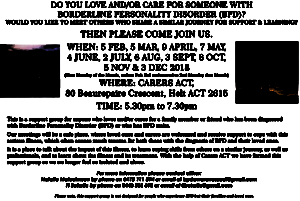Stress
Watching a loved one with BPD suffer and deal with complicated relationship problems can be very stressful for all family members. Seeing a loved one engage in risky behaviours that seem out of control can make family members feel helpless.
Repetitive engagement in self-harm behaviours can bring about chronic stress and severe trauma as it is often family members that manage high-risk behaviours such as bringing their loved one with BPD to the emergency room after a suicide attempt.
Guilt and responsibility
Research suggests that childhood abuse or neglect and genetics may contribute to the development of BPD. These findings lead many family members, especially parents of people with BPD, to feel great sense of guilt and responsibility even though the development of their loved one’s BPD was outside of their control.
Additionally, family members also struggle with what their responsibility is to the recovery from BPD. Some families try to be supportive but are worried their support can be reward and encourage some of the BPD-related behaviour. Others want to be supportive but can sometimes feel frustrated about the behaviours of the loved one with BPD. Some have difficulties with being supportive because they have their own psychiatric issues that can hamper their ability to empathise and respond appropriately.
Dealing with the mental health system
Stress within the family is heightened with the stress of accessing appropriate and effective treatment. Clinicans tend to rely on the family to help organise the treatment involving several providers and teams and different levels of care from attending appointments to occasional hospitalisations.
Family members are assumed a role for checking on their loved one’s emotional and medical status, transportation to treatments, coordinate searches for new options. Navigating the mental health system to find the best option is no easy task that places extra burden on the family.
Effects on family relationships
Parents of adolescents and adults with BPD describe the intense stress caring for their child can bring on strain in the marriage and even lead to separation or divorce.
Siblings or children of parents with BPD may be obliged to become caregivers, while others may distance themselves in order to protect themselves from emotional distress being in a close relationships with someone with BPD.
Extended family including grandparents, aunts, uncles and other relatives of the BPD family support network may feel the strain of caring for a person with BPD.
Support for the BPD family
It is not easy to get help for the family as much of the focus is on the person with BPD. If you suspect a loved one has BPD, and they are not yet in treatment, you can recommend therapy. BPD is a very serious mental illness that requires professional help.
To maintain a calm and safe home environment see Guidelines for loved ones of a person with BPD.
Check out Family Connections, a program throughout Australia including Canberra designed to offer education, skills training and support to family members of people with BPD.
BPD Awareness ACT holds a support group in the ACT on the first Monday of each month for loved ones of people with BPD. The support group is based on the principles of Dialectical Behavioural Therapy to ensure the group is a safe, nonjudgmental and positive place in which to seek support and learning from others who share a similar journey. The aim of the group is to reduce isolation and discredit the stigma against those with BPD and their families. Click here for more details.
For more information
BPD – The impact of BPD on family
Very Well – How BPD can affect a family
Siblings Australia – Promoting better support for siblings of children and adults with disability
Healthy Place – BPD relationships
Overcoming Borderline Personality Disorder: A Family Guide for Healing and Change
Centre for Addiction and Mental Health
Source
BPD Awareness ACT – Support group in the ACT for loved ones of those with BPD on first Monday of every month
LIZ – Her Mom’s longing for their past closeness
LIZZY – One potential disaster averted (her sister’s new abilities in action)
VALERIE PORR – Parent grief: When your child has a BPD diagnosis
To watch more interview footage about BPD and family go to Borderliner Notes.




